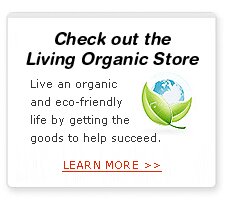Tweet Fertilizers deliver important nutrients to your plants. Organic fertilizers create a healthy environment for the soil over a long period, whereas inorganic fertilizers work much more quickly, but fail to create a sustainable environment. Organic and inorganic fertilizers supplement the soil and feed plants with nutrients. Organic fertilizers are composed of natural ingredients from … Read more
Important Facts About Organic And Inorganic Fertilizers
April 3rd, 2012 | Posted by Amy in Organic Farming | Organic Gardening - (0 Comments)Fertilizers, Green Gardening, Green Living, Inorganic Fertilizers, The Use of Organic
-
Search Store
-
Living Organic News Bytes :)
-
-
Store Categories
- Composting & Water Saving
- Safety & Emergency Preparedness
- Food Storage & Preservation
- Healthy & Eco-Friendly Living
- Organic & Eco-Friendly Food
- Organic & Eco-Friendly Cooking
- Organic Gardening & Farming
- Organic & Eco-Friendly Personal Care
- Organic & Eco-Friendly Office
- Renewable Energy & Energy Efficiency
- Homesteading & Self-Sufficiency
- Organic & Eco-Friendly Clothing
-
Living Organic Information
- Start Composting!
- Urban Homestead!
- Energy Efficient Renewable Energy Products!
- Organic Shopping!
- Organic Cooking!
- Organic Gardening!
- Home Water Conservation To Help Out The Environment and Your Wallet
- Food Storage and Preservation!
- Participating In Farmers Markets!
- Making Your Home and Office Eco-Friendly and Organic
- Growing An Organic Garden
- Access to Organic Goods Better Than Ever. What’s Your Excuse For Not Being Organic and Eco-Friendly?
- Finding the Time To Eat Healthy and Organic
- Gaining Knowledge On Being Organic and Eco-Friendly
- The ‘Real’ Cost Of NOT Eating Organic
-
Living Organic Categories
Copyright © 2012 LivingOrganic.org. All rights reserved.


